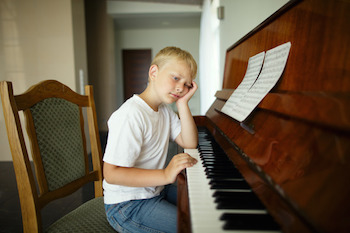As a child, if you ever played an instrument or took up a new sport, you probably heard the old saying “practice makes perfect” more than a time or two. It’s a familiar phrase everyone seems to use to try and get the routine of practicing to stick and become a part of our lives.
But is it true? Does practice make perfect? Increasingly the evidence is pointing towards the answer “no”.
towards the answer “no”.
Practice makes perfect. Lets imagine for a moment that your goal is to have your child play the piano. You want them to enjoy music and be able to carry that love throughout their lives. And of course it doesn’t hurt that you’ve heard it will make them a better student as well.
So you sign them up for piano lessons. But like most kids, they have other thoughts in their minds, and don’t love the concept as much as you do. They decide they “hate” going to lessons, and “hate” the chore of 30 minutes a day practice sessions that are forced upon them throughout the week.
In a case like this, no matter how much they practice, they will never perfect their skills. They may play a song better as time goes by, but it will probably sound mechanical, without the love and passion that makes a song have a strong voice.
The difference is in the approach.
Evidence now shows that practice doesn’t make perfect; deliberate practice makes perfect.
You can practice a scale over and over again, making it sound better over time.
You can play a song again and again, getting the notes perfect the more you play.
But the song, the melody, the voice of the music comes from feeling what you play. If you love playing the piano, if you deliberately practice what you play, it will stand out in the end.
If playing the piano has become a chore, its time to take on a new approach. Its time to find the love of playing, not just for the end results of being able to play a particular song.
If you love the outcome, the concept will be stronger from day one. And help you incorporate it into your life from this moment on.
Just remember, practice doesn’t make perfect, deliberate practice does.

